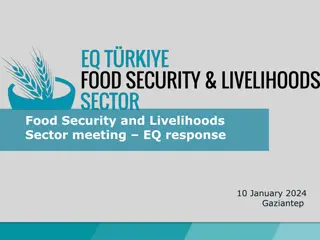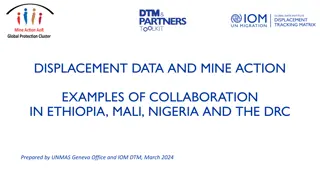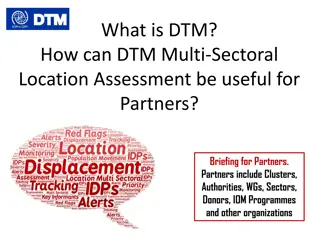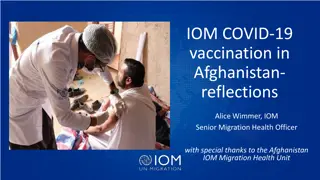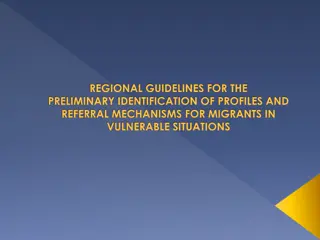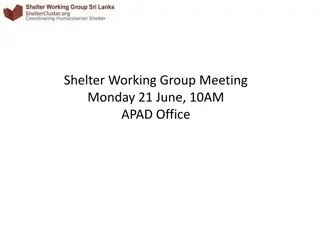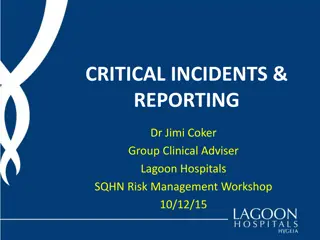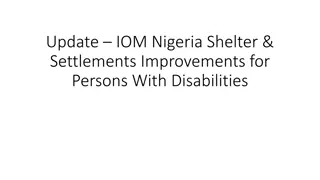Global Mobility and Legal Identity Strategy Presentation
Explore the significance of legal identity and global mobility in the context of migration and border management as presented by Mme. Mariama Mohamed Cisse, Director at IOM Special Liaison Office to the AU and ECA. The presentation addresses frameworks, principles, and strategies for ensuring legal
3 views • 14 slides
Food Security and Livelihoods Sector Meeting Response Highlights
In response to the EQ crisis, a meeting was held in Gaziantep discussing the 2024 program, partner updates, and action points. The 5W reporting highlighted the significant impact on beneficiaries. Partners such as Save the Children, IOM, and Oxfam have been actively involved. Useful links were share
0 views • 10 slides
DISPLACEMENT DATA AND MINE ACTION
Overview of collaborative efforts between UNMAS, IOM DTM, and local communities in Ethiopia, Mali, Nigeria, and the DRC to address explosive ordnance contamination, prioritize locations for risk education, and enhance mine action through data collection, awareness-raising, and information sharing.
0 views • 9 slides
Models and Concepts of Disability: Understanding the Disability Process and Components
Exploring various models and concepts of disability, this content delves into the disability process, including definitions, components, and interactions outlined by Nagi, IOM, and the ICF model. It highlights the perspective that disability is not inherent to the individual and can be preventable a
0 views • 24 slides
Understanding DTM Multi-Sectoral Location Assessment for Partners
DTM, or Displacement Tracking Matrix, is a comprehensive tool used in 80 countries to track movements in various contexts like conflicts and natural disasters. The Multi-Sectoral Location Assessment within DTM involves components like Flow Monitoring, Mobility Tracking, and Registration Surveys to g
5 views • 15 slides
Progress in COVID-19 Vaccination Efforts in Afghanistan
The International Organization for Migration (IOM) has been actively involved in COVID-19 vaccination activities in Afghanistan. Key achievements include vaccinating over 278,000 individuals, reaching vulnerable populations, and providing essential health services to over 255,000 people. The focus h
0 views • 10 slides
Guidelines for Preliminary Identification and Referral Mechanisms for Migrants in Vulnerable Situations
Regional guidelines emphasize the importance of providing protection to migrants in vulnerable situations while respecting their human rights. Technical support from IOM and UNHCR is crucial in identifying and referring vulnerable migrant populations. National workshops have been conducted to enhanc
0 views • 22 slides
Shelter Working Group Meeting Agenda and Updates
The Shelter Working Group Meeting is scheduled for Monday, 12th June at 10AM at the Save the Children office. The agenda includes assessments, information management updates, beneficiary selection guidance, IEC materials and DRR discussion, and AOB. Updates as of 11th June are available, along with
0 views • 7 slides
Update on Shelter Working Group Meeting and Relief Efforts
The Shelter Working Group Meeting held on Monday, 21st June at 10 AM discussed various agenda items, provided updates on flood-affected areas in Galle, Kalutara, and Ratnapura districts, and highlighted the ongoing relief efforts and future plans for assisting the affected communities. The meeting a
0 views • 11 slides
Managing Critical Incidents and Reporting in Healthcare Settings
This presentation discusses the importance of incident reporting in healthcare, focusing on critical incidents, factors contributing to errors, risk management components, fair-blame culture, human error, and the impact of adverse events. It highlights statistics on medical errors, emphasizes the ne
0 views • 44 slides
Enhancing Shelter and Settlements for Persons With Disabilities in Nigeria
The project by IOM Nigeria focuses on improving shelter and settlements for persons with disabilities through a qualitative assessment phase, inclusive of caregivers and households. Challenges include insecurity, limited resources, and adapting solutions to the local context while considering the wh
0 views • 18 slides

